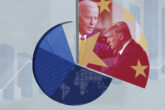December 28, 2017
The Oil and Gas Sector Is Changing — and So Is Geopolitics
WINDFALL
How the New Energy Abundance Upends Global Politics and Strengthens American Power
By Meghan L. O’Sullivan
479 pp. Simon & Schuster. $29.
Geopolitics is power played out against geographical settings. In this battle, ideas and ideologies matter. But it is often the most technical and complex factors — the ones we least understand and therefore discount, according to Columbia University’s Robert Jervis — that carry the greatest weight. There may be no factor more influential in contemporary geopolitics and yet least understood by journalists and policymakers than the energy revolution, which is less about renewables like wind and solar power than about how the oil and gas sector itself is changing. A Harvard professor and former assistant to President George W. Bush, Meghan L. O’Sullivan, has dissected the intricacies of this industry to offer a riveting and comprehensive geopolitical theory in “Windfall.”
The decline in crude oil prices from $100 per barrel to around $60 and below over the past two years, along with the widespread ability to extract shale gas through hydraulic fracturing of rock, or fracking, has moved the United States from being “the world’s thirstiest consumer of overseas oil to a position of greater self-sufficiency,” O’Sullivan writes. Falling energy prices have also stabilized Europe’s economy, helped Japan manage the aftermath of the Fukushima nuclear disaster, allowed China to more aggressively pursue its new Silk Road strategy across Eurasia (while reducing the pain of a decelerating economy), kept Russia from becoming an energy superpower and weakened the prospects for energy-rich sub-Saharan African countries. “On the whole,” the author says, “the new energy abundance is a boon to American power — and a bane to Russian brawn.” In fact, it was new extraction techniques in tight oil and shale gas that helped ease America out of the recession.
Read the full book review in The New York Times.
More from CNAS
-
Sharper: Emerging Technology
Emerging technologies are reshaping U.S. economic competitiveness and national security. These technologies offer unprecedented opportunities for growth, but also introduce na...
By Hilal Aka & Charles Horn
-
BONUS: Comparing China Sanctions Under Trump and Biden
Join Emily Kilcrease and researcher Eleanor Hume to discuss the latest edition of CNAS's Sanctions by the Numbers series, examining how the U.S.'s sanctions policy on China ha...
By Emily Kilcrease & Eleanor Hume
-
How Donald Trump Could Undermine the U.S. Dollar
The point here isn’t that sanctions can’t hurt the dollar — they can. But the real danger is misuse rather than overuse....
By Edward Fishman
-
Sanctions by the Numbers: Comparing the Trump and Biden Administrations’ Sanctions and Export Controls on China
Executive Summary The Biden administration has exceeded the Trump administration in the number of financial sanctions and entity-based export controls placed on Chinese person...
By Eleanor Hume & Rowan Scarpino




